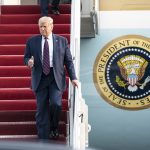In an intriguing turn of events, recent discussions surrounding the relationship dynamics of prominent political figures have revealed a considerable gap between the echo chambers of social media and the sentiments of everyday Americans. This dissonance came into sharp focus when Joe Scarborough and Mika Brzezinski, co-hosts of “Morning Joe,” sought to rekindle their partnership with Donald Trump, reminiscent of a diplomatic reset akin to the Vladimir Putin playbook. This situation has sparked conversations about the disconnect that seems to permeate the left, prompting reflection on how media narratives can stray far from the reality experienced by the general populace.
Social media platforms have become fertile ground for outrage and alarm, creating an illusion that their narratives represent the views of the wider public. In a recent analysis, it was noted that while social media was buzzing with criticism and conjecture, actual phone lines were ringing with positivity. People from across the globe reached out to offer support and convey appreciation for the efforts being made. This stark contrast highlights a critical issue: the loudest voices on social media do not necessarily reflect the sentiments of those who live outside its confines.
One such example came from a conversation with an individual named Eddie, who, like many others entrenched in the Twitterverse, expressed concern and sympathy. Yet, when the dialogue shifted to the influence of social media on public perception, reality hit. Eddie realized that by immersing himself in the often toxic and sensationalized online space, he was missing the bigger picture. The feeling among many Americans is clear—they want leaders who focus on pragmatic solutions rather than getting bogged down by online battles that seem detached from everyday life.
Moreover, an event attended by Brzezinski turned into a testament to the progress being made, ironically contrasting with the long faces of those overly absorbed in digital dissension. It’s apparent that while critics lament the state of affairs, those engaged in practical governance and community building are rolling up their sleeves, eager to make a difference. This perspective shift should serve as a call to action—not just for political leaders but for everyday citizens to look beyond their screens and engage with the world around them.
In summary, the gap between social media commentary and public sentiment cannot be overstated. As we navigate the complexities of political relationships and strive for a better America, it is vital to recognize the power of real-life interactions over virtual outrage. The hope is that as more individuals step outside their digital bubbles, they may realize that only through collaboration and understanding can true progress be achieved. And it certainly helps to keep a little humor in the mix—to remind us all that while politics may be serious business, humanity remains our greatest asset.




